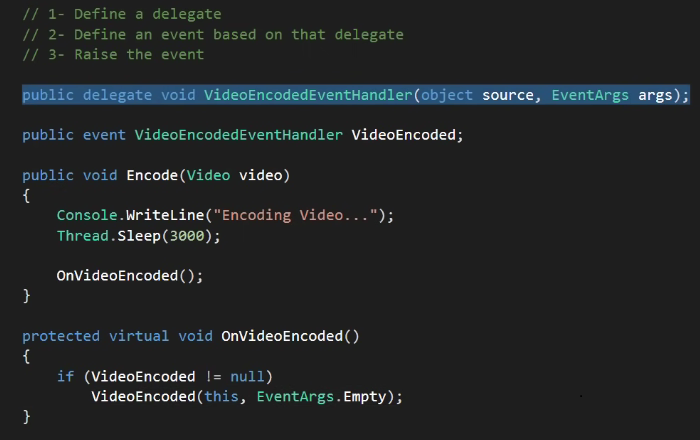✅ Events and Delegates question..
what is the point of using Events and Delegates, if you can just create methods which will just call other methods?
77 Replies
Linq is the biggest example
The idea of a delegate is simple
You just call the event once and every sript can subscribe to it
And they can all change what happens when the event is invoked
with += and -= you can add more functions to the event itself, so that when it's invoked more functions are executed
cant i do the same with just methods
i can add lines of codes, directly into the method that call other methods
can you give more details?
Cyberrex#8052
REPL Result: Success
Result: List<int>
Compile: 501.951ms | Execution: 74.936ms | React with ❌ to remove this embed.
with delegates you can dynamically configure what should be called
look up what's polymorphism
delegates are essentially equivalent to interfaces with a single method
One benefit of Events is that it's a way for children to pass information to parents. Alternatively it is also a solution where you need to pass information between two instances where one has a dependency with another and it needs to "subscribe" to anything that happends in it, which is basically the same thing as what I said firstly, but fancier.
Delegate types are useful for when you need to pass it as a parameter for something like linq, which uses delegates to filter, select or do any other type of equation
And yes, you can literally just pass a method instead
Yeah, kinda
I still don't understand benefit of delegates and events over regular methods
Method that holds several methods is quite literally same
the difference is that a delegate can point to different methods at runtime
if you have a method that just calls other methods normally, that's set in stone at compile-time
e.g...
the
random.Next() % 2 bit just means 'flip a coin, either heads or tails'
the code that eitherAddOrSubtract points to will be different every time you run this program
and this is why LINQ is powerful. when some guy at Microsoft sat down to write .Where(), he didn't know all the things we'd be doing with it today. but because we can give .Where() our own functionality at runtime, he didn't have toi just told you, it's polymorphism
Events can dynamically add subscribers at runtime. With a method, you would have to put FunctionOne() and FunctionTwo() in at runtime.
It's about who's got a reference to who. If a method in class A calls a method on class B, then class A needs to know about class B, and have a reference to it. If class B subscribes to an event on class A, then it's class B that knows about class A, and has a reference to it.
Think of a UI element for example, like a Button. You want some code to be called when the button is clicked. The Button class knows nothing about your code (why should it? You want the same button to be used in multiple places), but your class knows about the button. So you can easily subscribe to an event on the button, and the button class doesn't need to know that it should call your e.g. LogIn method when it's clicked
In your example you might aswell just create a normal method out of it 😛
Delegates have their own benefits and if you don't see the point of them you clearly never encountered these benefits
I suppose the idea of something being useless is reasonable if you never encountered a use, but most stuff in c# is there for a reason
And if not, it probably exists as an alternative to an already existing feature, and it is up to you to choose what to use
what about creating button with 1 class, that has info only about button
I don't follow what you mean
and create public methods, that will be called for each button?
that will be global
If you write a generic button, which can be placed anywhere on your UI, how should that button know what method to call when it's clicked?
oh, yeah thats true
Why should it care what method is called? It shouldn't. It should just be told "When you're clicked, call this"
buuuuut, ig you can do smth like
How does that bit of code get executed?
How do you know when the button's been clicked, so you can run that code?
just an example, that doesnt have any logic, and only demonstrates idea
Right but it's missing a critical concept
events?
How the button tells your code that it's been clicked
You can use events, or a list of methods, or a list of classes each of which implements an interface which has a "button clicked" method, or a message broker, or any other pub/sub system
Almost every language has a way to do this
hmm
what about making everything global?
that leads to unmaintainable spaghetti code
How would making everything global help?
Even if your "log in" button is global, it doesn't mean that it's been written to know what method to call when it's clicked
ok, one more question, what is the point of event ?
delegate - has references to methods, can *call *them when smth happens
That's the same as asking what the point of a property is. Why not just use fields
events - *notifies *every subscriber that smth happend
A property wraps a field, and lets you control who can set and who can read, add your own code to the getter/setter, etc. Same with events: they wrap a delegate field, let you control who can subscribe/unsubscribe or raise the event (importantly!), and add your own code to the add/remove accessors
well property gives you new abilities that field cant do, but as i understand (most likely wrong) delegate can do everything that event can do
It's the same distinction. A property is a pair of get/set methods which wrap a field. An event is a pair of add/remove methods which wrap a field that's a delegate
And they exist for the same reason that properties exist
1) let you control who can subscribe/unsubscribe or raise the event
isnt it possible to do with += and -= for delegate?
2)*and add your own code to the add/remove accessors *
is it done in order to filter things?
(the main reason is to stop someone outside of your class from raising your events. People outside can only subscribe, and can only unsubscribe themselves - they can't unsubscribe other people)
control access in a standard way
If you just used a delegate field, without the event wrapper, anyone could raise the event, and anyone could unsubscribe other people
properties do get set in a standard way
events do add remove
they can't unsubscribe other people is it for events?
imo making delegates multicast was a design mistake, also they should've been value types
idk, imo it gives you more possibilities
Yes. An event stops you from unsubscribing other people.
other people - methods from other classes?
Eh, you wouldn't be able to do CAS when modifying if they were value types. Which would make access more expensive
Yes
cas?
ohh, thats good point, i am always used to writing all methods in class Program (main class)
Compare and swap. The impl of add/remove uses CompareExchange to avoid a lock
thanks canton7, you helped me a lot
dont you mind if i close chat? looks like you have conversation
you mean it checks pointers? it can't possibly work that way tho, unless they also implicitly cache delegates for same methods on same objects
Look at the impl of an event on sharplab
Delegates are immutable reference types
well are you saying if I do
these would be the same reference?
It does the CAS when creating a new delegate with the new subscriber, and swapping that into the delegate field backing the event
how do they cache the reference?
btw, it doesnt, right?
I would guess no
Look, this is common knowledge. It's very easy to see what the compiler does here. Just open up SharpLab, create an event, look at the decompiled C code
easier said than done when you're on phone lol
Yeah, I am too which is why I haven't pasted it 😆
Classic CAS
And two delegates created from the same method compare equal (but not necessarily those from two lambdas, which is a gotcha). But that's only relevant inside
Delegate.Combine / Delegate.Remove and isn't relevant to the CAS in the add/remove handlersoh, btw
when i used to be complete toddler in programming, i thought that classes are meanengless, because, instead of just using properties with classes, i used to create variables, and connect them by my own, like int Object1Age, Object2Age and string Object1String, Object2String, which is not as convinient as classes .
As i understand, this post has kinda same vibes. Instead of creating events, i used method that call methods, which is not as convenient as events
Events only make sense when you have multiple classes. There's very rarely any need to use events within a single class
in case of single class, delegates are good option, right?
delegates solve a different problem
I don't understand this code, but it looks as if it would make tons of garbage
generally, delegates are created for making code easier to read/understand and write?
cause delegates is just like object that holds method. Which is easier to understand than method that calls methods (and its not convinient to add new methods into that method)
no
fuck
Not really no. It'll create a new delegate instance every time you add a new subscriber, unless there's a race
why not
delegates were created because we wanted to use functions as variables
thats all there is to it
yeah, but from other perspective, it also makes reading/writing code easier (kinda)
you're talking about anonymous functions, which is not the same as delegates
anonymous functions make dealing with context automatic and let you type less code
oh, ok
aaaand, last quesiton

why does event raiser must be virtual?
Well, they are rather related...
Convenience. It lets subclasses tell when the event is being raised without needing to subscribe to it, by overriding that method
ohhhh
wooww, it is cool  guys, you really helped me!!!!
happy new year, have a good time
/close
guys, you really helped me!!!!
happy new year, have a good time
/close
 guys, you really helped me!!!!
happy new year, have a good time
/close
guys, you really helped me!!!!
happy new year, have a good time
/closeUse the
/close command to mark a forum thread as answered